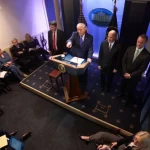

Senate leaders are sounding the alarm over the possibility that a critical intelligence surveillance tool could lapse temporarily Friday unless senators reach an agreement to speed up the passage of the bill that would renew the program for two years.
Section 702 of the Foreign Intelligence Surveillance Act, which authorizes the government to spy on foreigners abroad, is set to expire on Friday, and top lawmakers on both sides of the aisle are urging their colleagues not to engage in a battle over amending the House bill.
Sen. Mark Warner (D-VA), the chairman of the Senate Intelligence Committee, praised the law as a critical tool in identifying terrorism threats and emphasized any kind of lapse in the program could become a major national security problem.
“The notion that we would let … the crown jewel of our intelligence collection abilities to go dark as we simultaneously debate aid for Ukraine and Israel and humanitarian relief to the Palestinians in Gaza, to let it go dark at this moment in time would be the height of irresponsibility,” Warner said during a speech on the Senate floor on Wednesday.
Privacy hawks on both sides of the aisle in the upper chamber have raised concerns regarding the House-passed bill, which ultimately did not include a warrant requirement for federal agencies to search U.S. citizens’ data, which was a major point of contention. The demand for restrictions for federal searches became even more prominent last week when former President Donald Trump spoke out against reauthorizing the law, claiming it was misused to spy on his presidential campaign in 2020.
The House added a provision to cover new types of data service providers to keep up with advances in technology over the past 15 years, causing some critics to label the changes as a “vast expansion of surveillance authorities.”
“If you have access to any communications, the government can force you to help it spy,” Sen. Ron Wyden (D-OR) said Tuesday. “That means anybody with access to a server, a wire, a cable box, a Wi-Fi router, a phone, or computer. This can all happen without any oversight whatsoever.”
Sen. Mike Lee (R-UT) is also urging his colleagues to reconsider the House bill to include a warrant requirement.
“Politicians who love freedom don’t authorize warrantless surveillance of American citizens,” Lee wrote in a post on X, formerly known as Twitter.
“FISA 702 should not be reauthorized without a warrant requirement to protect Americans,” Lee wrote in a separate social media post.
The Biden administration is attempting to push back on that criticism, sending a memo to Senate offices arguing the bill “does not expand the scope” of who can be targeted and explaining the limitations in how the new program can be utilized, including in places such as restaurants, hotels, restaurants, and inside individuals’ homes.
Warner warned his Senate colleagues that a lapse in the program could cause unforeseen consequences, such as private companies refusing to work with the intelligence community and critical congressional committees.
“In the event of a statutory lapse, some providers, American companies that are working with us, are likely to stop a reduced cooperation, perhaps with existing targets of collection, but especially with new ones,” Warner said. “We know this can happen — because it’s exactly what happened when a similar lapse occurred following the lapse of Section 702’s predecessor statute, the Protect America Act.”
Senate Minority Leader Mitch McConnell (R-KY) also tried to push back on criticism from some senators on both sides emphasizing those demanding a warrant requirement are misguided.
“All the House did was fix a dangerous loophole that would have allowed our foreign adversaries to escape the reach of our intelligence services,” McConnell said on Wednesday.
The Senate is expected to take its first vote on the bill Thursday evening and will be required to make a deal on debate and amendments to avoid the lapse of the program’s authority.
However, some outspoken critics of the program said they’re willing to let the program expire over the weekend if changes to the bill aren’t considered on the Senate floor.
“We need to debate — we’ve had five years,” Sen. Rand Paul (R-KY) told reporters Tuesday. “I would think we’ve got time to debate whether or not it’s appropriate for our government to spy on its own citizens without a warrant.”
Paul said he would agree to fast-track the process depending on how much debate is allowed on the floor, and denounced “scaremongering” to rush through the process.
“I’m not concerned with the date,” Paul said. “If all else fails, I think we can live under the Constitution maybe for a day, maybe two days.”
CLICK HERE TO READ MORE FROM THE WASHINGTON EXAMINER
Sen. Jon Tester (D-MT), who is up for reelection in perhaps one of the most competitive Senate races in the country, came out against the bill on Wednesday afternoon.
“I do not support reauthorizing FISA Section 702 in its current form and call on the Senate to take action to stop warrantless searches by the government and law enforcement agencies to protect Montanans’ freedom and privacy,” he wrote in a statement.






